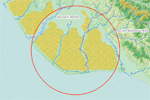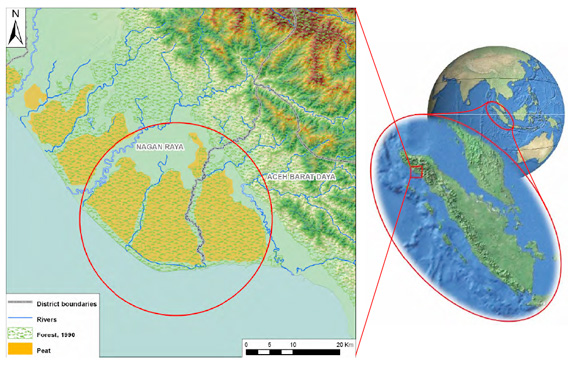The former governor of Aceh, Irwandi Yusuf, told The Sydney Morning Herald today that an oil palm plantation he approved was “not wrong legally, but wrong morally.” Irwandi, who is currently seeking re-election, signed off on the hugely controversial plantation in deep peat forest last August, but the issue came to a head this week as satellite images showed a dozen fires burning in the concession area known as Tripa. Environmental groups, which are running an online campaign, warn that the burning is imperiling an important population of Critically Endangered Sumatran orangutans (Pongo abelii).
Speaking to the Sydney Morning Herald, Irwandi, who had been known as a staunch champion of Sumatra’s forests and was a leader in the Governors’ Climate and Forests Task Force, gave insight into why approved the plantation for palm oil company, Pt Kallista Alam. He said that he is frustrated with delays over the UN’s REDD+ (Reducing Emissions from Deforestation and Forest Degradation) program, which proposes to pay countries to keep forests standing.
“The international community think our forest is a free toilet for their carbon,” he told the paper. “Every day they are saying they want clean air and to protect forests…but they want to inhale our clean air without paying anything.”
Irwandi admitted that he “hated” the oil palm company, PT Kallista Alam, but appears to have wanted to send a message to the international community. He described the 1,600-hectare concession as a “pinch” to the outside world, and then threatened to lift Aceh’s current moratorium on primary forest clearing in order to “make them look at Aceh.”
“No orangutans”
 Sumatran orangutan. Photo by: Rhett A. Butler. |
Irwandi told the Sydney Morning Herald there were no orangutans in PT Kallista Alam’s concession, citing an investigation by his officials, which he states did not find any of the Critically Endangered species.
However, conservationists contend that the Tripa peatland forests are currently home to a few hundred Sumatran orangutans, and not long ago held as many as 3,000. Conservationists fear that the fires raging in Tripa could push this particular orangutan population–now estimated at less than 200–over the edge.
In total around 7,000 Sumatran orangutans survive in the wild today. The population has dropped 80 percent in the last 75 years, largely due to habitat loss.
Legal wrangling
An Indonesian environmental group, WALHI, has filed a lawsuit against PT Kallista Alam’s concession, arguing that the forest was initially listed as a no-go area in Indonesia’s national moratorium on deforestation and is doubly-protected as apart of the Leuser ecosystem. In addition, the group argues that local people were not consulted ahead of the concession being granted.
Irwandi, however, insists the plantation is legal, although he says he is “very sorry” for it.
WAHLI’s lawsuit was tossed out of court this week by a judge in Banda Aceh who said the group should seek settlement with the company before turning to the courts. WAHLI noted they would likely appeal the decision and questioned why it would take the court five months to make the settlement recommendation all the while PT Kallista Alam drained the Tripa peat forest.
Sumatra is a focal point for the global fight to save the world’s forests, since the tropical island has lost nearly 70 percent of its lowland forests since 1985. In addition to Sumatran orangutans, the island is the last stand for the Sumatran elephant (Elephas maximus sumatranus) and the Sumatran tiger (Panthera tigris sumatrae), both of which are listed as Critically Endangered. It is also the only place in the world where tigers, elephants, rhinos (the Sumatran rhino), and orangutans co-exist.
Related articles
Featured video: the battle for Tripa is about people too
(04/05/2012) Environmentalists have largely focused on the plight of orangutans as fires burn in Aceh, Sumatra to clear rainforest for a hugely controversial palm oil plantation, however as the video above highlights, local people will also feel the impacts of the destruction of forest for palm oil.
Environmentalists, orangutans lose court case over palm oil
(04/03/2012) Environmentalists were handed a set back in a dispute over a palm oil plantation granted in a protected peat swamp that is home to a population of critically endangered orangutans, reports the Aceh Globe and the Sydney Morning Herald.
NASA imagery confirms fires burning in orangutan hotspot
(03/27/2012) Satellite data from NASA confirms that fires are burning in an orangutan hotspot slated for conversion to oil palm plantations.
Fires raging in peat forest at center of legal case in Indonesia
(03/27/2012) Fires are burning in a peat forest that is the center of contentious court case.
Palm oil case against ‘Green Governor’ in Indonesia heats up

(03/22/2012) Environmental activists have launched an urgent appeal calling for a ‘just decision’ in a court case that has pitted Aceh’s ‘Green Governor’ and palm oil developers against efforts to save endangered orangutans in a Sumatran peat forest. In letters directed toward judges weighing the case in Sumatra’s Aceh Provice, Indonesian President Susilo Bambang Yudhoyono, the country’s REDD+ authority, the World Bank, and the Governors’ Climate and Forests Task Force (GCF), a coalition of conservation groups says the outcome of the case could have substantial implications for efforts to conserve Indonesia’s remaining forests and peatlands.
